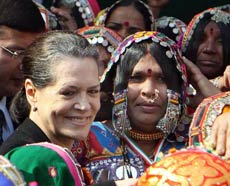Growth be damned: Lessons Sonia Gandhi learnt from Indira Gandhi,Indira Ghandhi, Sonia Ghandhi,National news, Latest news, latest and political news, political news, Latest and breaking news, breaking news.
- Details
- Category: National Political News
- Last Updated: Thursday, 22 January 2015 20:48
| Growth be damned: Lessons Sonia Gandhi learnt from Indira Gandhi. |
|
Congress President Sonia Gandhi isn’t a naturally-gifted politician. But unlike her son and chosen heir Rahul Gandhi who seems perpetually a deer caught in the headlights, Sonia is actually an astute politician. After fifteen years at the helm of the Congress, during which she led the party to its worst ever defeat and then to two successive victories, she knows what she is doing. There is no doubt that Sonia Gandhi knew only too well that the rupee would tank the moment Parliament passed the Food Security Bill. She knew equally that the dire macroeconomic situation would only deteriorate at the announcement of her pet populist project. But it is her considered calculation that it is the Food Bill (and other assorted populism) which will deliver her party a third term in office, growth be damned. Now her view may seem detached from reality to you and I, but not to the ghost of Indira Gandhi. India hasn’t ever produced a populist politician quite in the mould of Sonia’s late mother-in-law. Conventional wisdom in the present suggests that it was Indira Gandhi’s leadership which caused the maximum damage to the Indian economy – by throttling the private sector and destroying institutions of the state apparatus — a legacy the country is still struggling to shake off. And yet, in opinion poll after opinion poll, almost thirty years after her tragic assassination, Indira Gandhi continues to be rated as the best prime minister India has ever had. It is well known that Sonia always considered her mother-in-law a role model. But it would seem the people of India do too.  So, if Indira Gandhi can retain such popularity despite several excesses – apart from the economy, she nearly destroyed democracy with the Emergency, and don’t forget she had an errant younger son, Sanjay Gandhi – surely Sonia can succeed (despite an errant Vadra, and far fewer political excesses) because populist economics apparently erases all other flaws in the eyes of the voter. The Congress firmly believes that it was populism that delivered it a second term in 2009. After all corruption was an issue even in UPA 1 – CWG was already news as was the 2G scam as early as 2008. And then there was a cash-for-votes scandal just months before the election. Economic growth had collapsed in the nine months before elections because of the global crisis. Still, the Congress won with an increased mandate – because of NREGA and the farm loan waiver if the Congress view is to be believed. The contrary view, of course, is that UPA was rewarded for four and half years of almost double digit growth (before the global crisis struck), which delivered unprecedented prosperity to hundreds of millions of Indians, particularly in urban areas which voted decisively for Congress. Which of the two views is right will be known in 2014, since economic growth has collapsed and the Congress has only populism to show for itself. But there are reasons to believe that Sonia Gandhi’s populism isn’t going to be as potent as Indira’s. For one, Indira by the sheer force of her personality and communication skills had a better connect with voters than the reticent Sonia has. Second, at least some of Indira’s populism was seen as acting against “hereditary privilege”. The abolition of privy purses was one such example. The nationalization of private sector banks which catered mostly to established business houses was another. Now, the Congress itself is so wedded to protecting “hereditary privilege” (within India’s party of freedom) that it’s populist pro-people rhetoric seems hollow. Third, the populist garibi hatao slogan in 1971 seemed a more radical idea then than it does forty years later, when India as a whole is not as poor. Third, Indira’s decisiveness (even when populist) which propels her to the top of opinion polls even now is sorely lacking in the Congress of the present day. Indira partitioned Pakistan, but Sonia is unable to prevent the beheading of Indian soldiers on the border. It is memory of this decisiveness (rather than policy detail) which makes younger voters pro-Indira even though most were born after her death. Still, Sonia Gandhi has placed her political bet on the ghost of Indira Gandhi. In 2014, we will find out whether ghosts really exist. source:http://www.firstpost.com |



